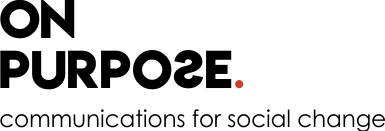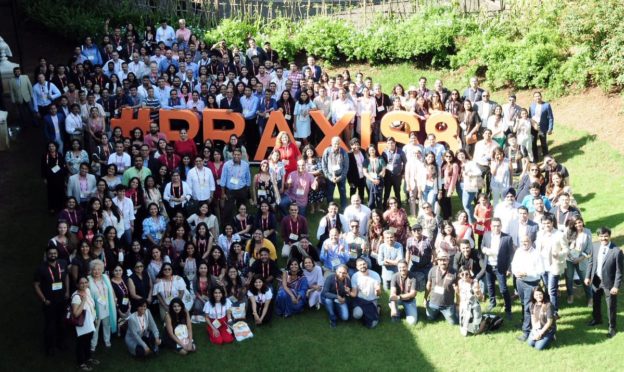This was our second-year sponsoring PRAXIS. As a bootstrapped start-up, just over 2 years old, we consider it a privilege to be able to support our industry and be an active participant in the discourse shaping its future. We wouldn’t have it any other way.
Here are a few takeaways for our clients and others who couldn’t’attend:
- Symbolism does more harm than good: In the rush to be ‘purposeful’ brands often attempt to showcase alignment with trending causes without making the time and effort to align the company’s culture and way of working to support them. Mathew Harrington, Global COO of Edelman, showed us a few examples including McDonald’s flipping their arches to form a ‘W’ in honour of women’s day. The gesture attracted flak from people calling out the brand to first pay its employees a living wage and stop zero-hours contracts that was leading some women workers towards poverty and homelessness.
Takeaway: Customers can see through marketing ploys disguised as purpose to sell more product. Avoid symbolism towards causes if it isn’t rooted in company culture.
- Trust is built on perceptions, it’s always the little things: Trust is all about emotion and hope and how a brand makes an audience feel. It’s the social glue that’s formed by people and brands saying what they’ll do and doing what they’re saying. Shiv Shivakumar, Group Executive President, Corporate Strategy, Aditya Birla Group delivered the keynote focusing on leadership attributes that build trust within organisations as well as a brand’s relationship with its constituents. He gave examples of when local offices of global firms are asked to communicate developments without understanding the local context of how a message may be received, it’s a recipe for disaster in corporate communications. From a leadership perspective, he talked about the power of trust in building safe workspaces – “Trust is – I will not hurt you when you are vulnerable.” The hall was silent.
Takeaway: Trust people to do what’s right.
- Diversity is about how much efficiency we’re willing to sacrifice: In his session, How Goodness and Trust Can Change the World, Indian author, Devdutt Pattnaik drew analogies from Indian mythology to share lessons for the PR world. One of the key points he made was that business, by definition, hates diversity. Because diversity is inefficient, and businesses are all about efficiency. “Diversity is accepting that not everyone wants to listen. When we accept that, we calm down.” Devdutt had the hall in splits for most of the time, dodged some tough questions on the Indian government and its leadership – with style and wit and doubled up as a stand-up comic, showing the PR world the mirror while reminding us of our roles in keeping brands true and authentic.
Takeaway(s): Too many. The one on the tension between diversity and efficiency was probably the most interesting. A challenge for brands to look at diversity and inclusion from the lens of business effectiveness rather than efficiency
- Is creativity a function of naughtiness? In a pre-conference conversation with Regional Director, APAC, Archetype, Lee Nugent, people of ON PURPOSE were treated to a quick lesson on how to build high-performing teams at work and what it takes to unleash creativity for clients. Lee drew interesting observations across Singapore, the United Kingdom and India where he described how cultures and sub-cultures within nations and cities (countries within countries he said) impacted how freely teams could think about ‘Ideas that would get us fired’ – and be able to challenge ourselves with fresh and original ideas for clients. “You have to mis-behave a little bit and think differently to achieve outstanding creativity,” he advised. Lee also mentioned the importance of giving people space to express themselves by sharing a framework/boundary to work within and then letting them loose. He said it is okay to try something different and make mistakes.
Takeaway: Introduce a bit of naughtiness at work. We’re taking this very seriously at ON PURPOSE.
- Take a break, before you breakdown: The PR industry is notorious for long working hours, with poor systems and processes that leaves a lot of the doing down to ‘winging it’ and suffers from a constant lack of validation as compared with other disciplines in the marketing mix. This was raised first in a masterclass by Dr. Samir Parikh, Psychiatrist and the Director of Department of Mental Health and Behavioural Science, Fortis Hospitals and later in a conversation with CEO of The Holmes Report, Arun Sudhaman. “There are two sides of unmuting- speaking about your stresses and speaking to others about their stresses without judging. While replacing words with Emojis and limiting ourselves to character limits, we are limiting our expressions,” Dr. Parikh said. Unfortunately, in the PR world, mental health issues are linked with performance instead of being treated as a medical condition as it is. Gone are the days of ‘keep your personal and professional separate’, the workplace needs to be a constant place of support where vulnerabilities are treated with importance, we don’t need to keep it together all the time. It’s okay not to be okay.
Takeaway: As an industry we need to do better to remove the stigma around mental health issues in the workplace. Raising awareness is a first step.
- Mind your own business: As an industry, we often fall prey to comparisons and forget to embrace our own individuality. In a treat of a session, actress Richa Chaddha gave us the lesson of a lifetime – “Duniya Main Sabse Bada Rog? Kya Kahenge Log,” she said while sharing lessons from her own career of fighting patriarchy and carving out a niche for herself in Bollywood. Talking about trust in an un-trusting world, she encouraged all of us to have faith in ourselves, our beliefs and what makes us unique. She also apologised to a microphone, for knocking it, and exclaimed in loud horror, “OMG, I can’t believe I just apologised to a microphone – that’s how conditioned we are to constantly be apologising for ourselves.” She asked the audience not to share any pics of her with her new hairstyle as she’d been growing her hair for a new movie and couldn’t have it released on social media. The audience obliged. Not a single pic from PRAXIS showed Richa Chadha’s face. Real trust in action.
Takeaway: Be unapologetic.
- What can be measured is often a distraction from what really should be: For an industry that has arisen from the power of the written word and is just coming to terms with the new visual world of storytelling, asking its practitioners to become comfortable with data and analytics is like asking them to go to school all over again. And we must. The new age public relations practitioner must act like a six-blade knife. The big serrated edge – to saw through the toughest communication challenges. The ball-breaker – to ensure goal setting for every communications exercise and that everything gets measured. The bottle-opener – to celebrate every win that recognises the role of communications in building a brand. In her session on ‘Can Trust Be Measured,’ Johna Burke, Managing Director, AMEC talked about the Barcelona Principles 2.0 and shared an Integrated Evaluation Framework to help brands go beyond likes and retweets and measure what matters. Click on this link to see it in action: https://amecorg.com/amecframework/
Takeaway: It’s our responsibility to help brands set goals with metrics that help align the PR effort towards business outcomes and not simply rely on metrics that can be measured.
- Finally, lead with purpose and personal conviction: In her address on ‘360 Respect, Meet the new CEO’, Founder and Global CEO of WE, Melissa Waggener talked about the importance of the leader building trust with stakeholders, both internally and externally. She set context with an interesting exercise, making us write about the one quality we admire in our heroes. This quality, she suggested needs to form the base for the 360° trust we need to create. She pointed out how great brands are formed with a combination of excellent products or services and positive societal impact. Purpose and profit are not mutually exclusive, although purpose marketed with the sole intention of securing more profit, rather than genuine societal impact will not work – “You can’t fool all the people, all of the time.” Purpose also does come with consequences, she asserted. A lot of an organisation’s values are set by the power of conviction from its leader.
Takeaway: The leader sets the tone for organisational purpose. As communicators, our role is to help leaders communicate their beliefs in a genuine way, that helps people believe in who they are at their core and what they stand for.
That’s it. Thanks for reading folks. Feel free to scroll through our social media handles (Twitter, LinkedIn, Facebook and Instagram) for more visuals and snackable content on #PRAXIS8.
Let us know if any of this appealed to you and you’d like to hear more. We’ll be happy to get in touch.
Picture credits: Amith Prabhu
Team ON PURPOSE.

